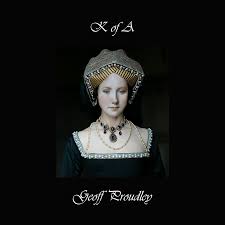
There are many among us who consider Rick Wakeman’s debut solo album, the Six Wives of Henry VIII to be a scintillating masterpiece and rightly so, as it showcased a massive young talent with a historical inspiration in showing off his amazing skills on a wide variety of keyboards. Each wife got an interpretation that clearly was in the Yes man’s head and his flexible fingers did the rest. Nearly 50 years later, British artist Geoff Proudley decided to embark on a more focused interpretation of the first wife of Henry VIII, the rather interesting Katherine of Aragon. Spanning nearly an hour and a half, the 22 pieces on this remarkable release, packaged in a precious CD box with a massive booklet is surely a treasure I will enjoy for many years to come. For a lifelong amateur historian like me, how could I possibly resist? Her life story was a lengthy struggle against interminable difficulties, and one really needs to peruse the booklet while listening as the story unfolds, in order to truly appreciate the effort Geoff has done in putting into music all the events that befell her life. Just a little intro to get you interested: “Catalina” was born the daughter of The King and Queen of Spain; she was proposed at the age of 3 to the Prince of Wales but the latter died a few months after their wedding. While waiting to marry the headstrong Henry VIII, she was the first known female ambassador in European history. That is all the info I am offering; the rest of her life story is in your hands and eyes. Geoff demonstrates remarkable proficiency on grand piano throughout this release, but also infuses harpsichord, organ, choir mellotron, various synthesized instruments, lush orchestrations that painstakingly highlight the period of the 1500s, a time when the Renaissance and Baroque periods were at their peak.
As per her tragic life, things start out relatively positively during the first half composed of 10 tracks and progressively (oops!) turn to a slowly building catastrophe as the remaining pieces divulge a darker tone.
The epic opening statement “Conquest” serves to set the tone from the get-go, heavily classical influenced bombast of the finest vintage. An elegant piano arises from the storied fields of Spain, hauntingly elaborate and passionate. As the cinematographic pace picks up in momentum, the orchestrations become resolute. Synths are used in a more classical sense eschewing zippy little solos for a more comprehensive feel, with occasional castanets, Hispanic suggestions of ‘rios’ and ‘cordilleras’, a soundtrack latitude that bodes well for the proceedings. On “Leaving Spain”, the mood veers away from the previous Spanish feel, for the long maritime voyage will lead the princess to England to eventually marry the King. “The Crossing” evokes turbulent tempests, salty gales, whopping whitecaps, and the seemingly endless expanse of water and time (the track is fittingly the longest at 8 minutes!). The various instruments create an aquatic ambiance of hope and adventure that is quite enthralling.
On a resonating track like “Alliance”, the music leaps away from the Middle Ages into the light of artistic illumination, within highly palpable, mostly joyous, upbeat, and serene arrangements that describe the story and the era perfectly. The overtly Tudor feel merges into a more Spanish sentiment as the two powers join into a monarchic union. The sombre yet crushingly beautiful “Solace” is a sheer masterpiece, even Rick would applaud heartily. The tremendous harpsichord (a sadly underused instrument in prog) is once again, front and center on the colossal “Ambassador”, a playful yet diplomatic excursion into the complexities of communication between friends and enemies alike. Pipe organ and echoing choir work on the bombastic overflow of “Coronation” infuses an image of grandeur, power, majesty (excuse the pun) at the ceremony of the crown being placed on the royal head. There is lot of euphoric amusement as well as exploding fireworks on the lively “A Prince for A King” which conjures images of torch-lit banquets, minstrels and troubadours clapping at all the fun, with many krummhorn, recorder and bassoon sounds that could easily suggest classic Gryphon.
The atmosphere veers into the predictable darker realms, with sombre synthesized orchestrations on “the Future Now Denied”, a funeral for the infant Prince, which promptly segues into an extended church organ fluster that portends a hard road ahead, where her duty in defending the country showed her resolute bravery (“Queen Regent”). A little cheerful piano breather on the delicate “Mary”, an heir of the wrong sex according to the King’s wishes but nevertheless a surviving offspring is a sheer delight, as is its polar opposite, the doom-laden contemplation of “The Shrine”, where a solitary praying figure outlines the desperation of another failure.
The fierce brutality of knights in full armour, a lethal pointed lance held forcefully under arm, hurtling towards each other in some ensuing collision is expertly portrayed on the galloping cavalcade “The Joust”. A sport the King fancied, but in his momentary lapse of reason, he almost gets his head splintered, albeit by accident.
By the time the ominous instrumentations on “Dark Forces” meander through the speakers, it is clear that the regal relationship is veering towards a divorce and the presence of the fiery upstart Ann Boleyn becoming a worrisome affair. Katherine does not fold, defiant in the face of the inevitable and the music reflects the drama most effectively. With tracks like “The Legatine Court” and “The Inexorable Tide”, the political manoeuvring reaches a frenzy of manipulation, pleading and pressure. What will be the outcome? The compositions reflect all these trials and tribulations with the right amount of agony and despair, the piano in particular reflecting an almost Kafka-esque injustice in its insistent tones.
Her intense sorrowfulness is reflected on the weeping “On Why Has Thou Forsaken Me”, as Geoff masters the ivories with incredible accuracy and sentiment. This is another breathtaking sliver of genius. The Queen was on her way out, to be replaced very soon, as she must face “Banishment in Exile”, with all her dignity still intact. The colossal pipe organ on “Katherine the True Queen” bellows in utter resonance to the fight Katherine undertook to never falter in her commitment and remaining praiseworthy from both her people and historians alike. Cancer had ravaged her isolation even further, and in answer to the multitude of prayers that emanated from her courageous spirit, she even pardoned the King in her final and eloquent final letter to him. “Ascension” is a fitting, celestial finale.
While some might find 80 minutes a tad too demanding on their stressed patience, let me say that this was an absolute breeze, an epic narrative that allocated me the opportunity to sit down and listen, read the booklet intently and (I know its hard in todays world) IMAGINE the specifics of her life with my own thoughts, descriptions, colours, and particulars, a grandiose score providing my imagination with endless fuel and sustenance in daring to dream my own dreams, is what makes art such a vital panacea.
5 states of heaven








